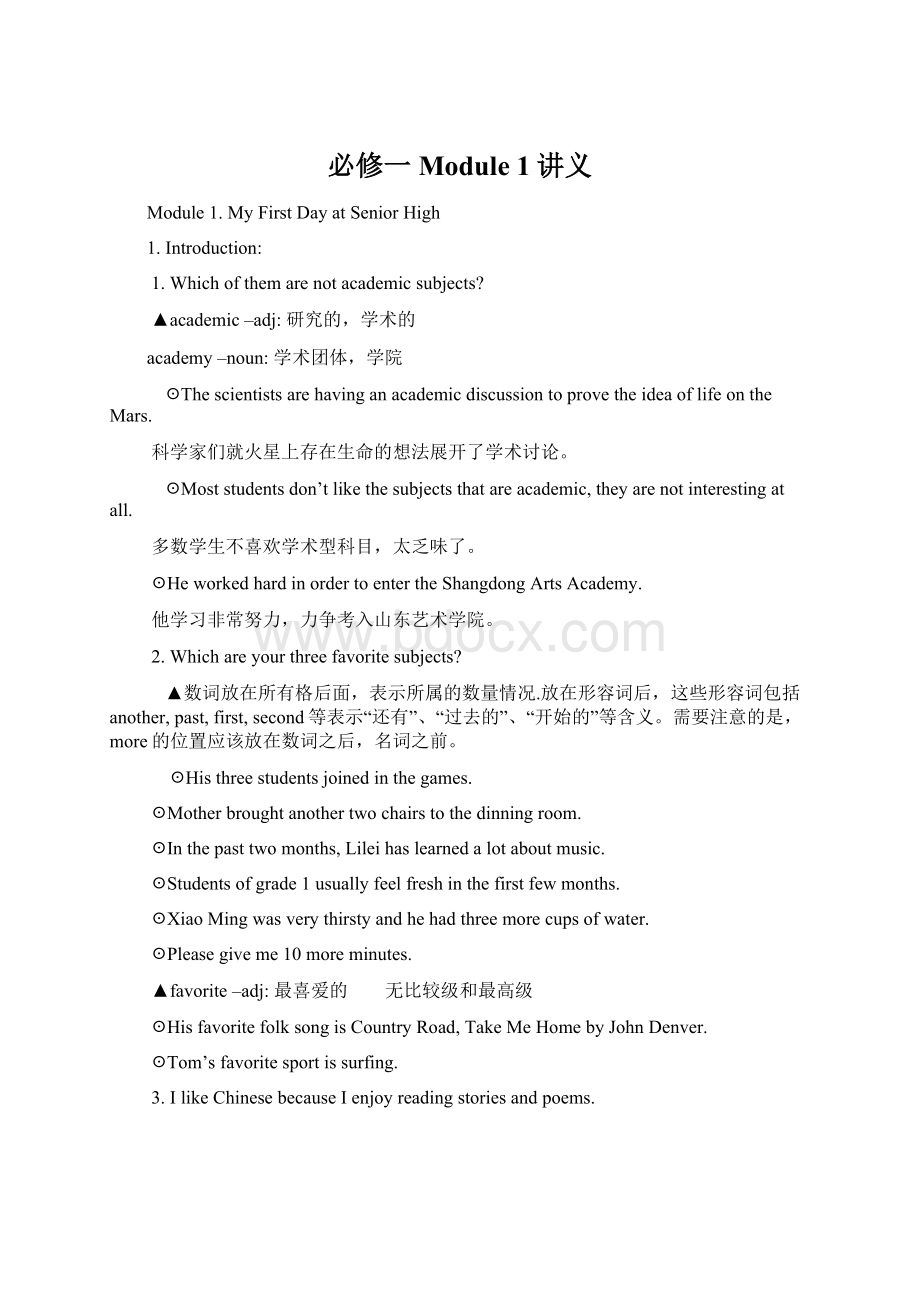必修一Module 1讲义.docx
《必修一Module 1讲义.docx》由会员分享,可在线阅读,更多相关《必修一Module 1讲义.docx(16页珍藏版)》请在冰豆网上搜索。

必修一Module1讲义
Module1.MyFirstDayatSeniorHigh
1.Introduction:
1.Whichofthemarenotacademicsubjects?
▲academic–adj:
研究的,学术的
academy–noun:
学术团体,学院
☉ThescientistsarehavinganacademicdiscussiontoprovetheideaoflifeontheMars.
科学家们就火星上存在生命的想法展开了学术讨论。
☉Moststudentsdon’tlikethesubjectsthatareacademic,theyarenotinterestingatall.
多数学生不喜欢学术型科目,太乏味了。
☉HeworkedhardinordertoentertheShangdongArtsAcademy.
他学习非常努力,力争考入山东艺术学院。
2.Whichareyourthreefavoritesubjects?
▲数词放在所有格后面,表示所属的数量情况.放在形容词后,这些形容词包括another,past,first,second等表示“还有”、“过去的”、“开始的”等含义。
需要注意的是,more的位置应该放在数词之后,名词之前。
☉Histhreestudentsjoinedinthegames.
☉Motherbroughtanothertwochairstothedinningroom.
☉Inthepasttwomonths,Lileihaslearnedalotaboutmusic.
☉Studentsofgrade1usuallyfeelfreshinthefirstfewmonths.
☉XiaoMingwasverythirstyandhehadthreemorecupsofwater.
☉Pleasegiveme10moreminutes.
▲favorite–adj:
最喜爱的 无比较级和最高级
☉HisfavoritefolksongisCountryRoad,TakeMeHomebyJohnDenver.
☉Tom’sfavoritesportissurfing.
3.IlikeChinesebecauseIenjoyreadingstoriesandpoems.
▲enjoy–vt:
喜欢,强调享受某种乐趣。
后面跟名词、代词、动名词,不能跟不定式做宾语。
类似的动词有:
finish,suggest,excuse,pardon,giveup,avoid,risk,advise,practice,consider(考虑),delay,escape,miss,imagine,mind,keep,can’thelp(禁不住)。
☉MycousinJimenjoysTVplaysverymuch.
☉Whodoesn’tenjoyrockandrolltoday?
☉Thanksalotforyourbirthdaycake.Ireallyenjoyedit.
☉YoungpeoplelikeyouenjoyreadingJinYong’sactionnovels.(武侠小说)。
☉Thankyouverymuchfortheparty.Weenjoyedourselvesverymuch.
2.ReadingandVocabulary
1.WhatarethemaindifferencesbetweenJuniorHighschoolandSeniorHighschool?
▲main–adj:
主要的,侧重于总括含义=general.
☉Themainthingswelearnedtodayishowtomakesentenceswith“if”.
▲between–prep:
在两者之间
among–prep:
在。
。
。
之间,指三者或三者以上
☉Thisisasecretbetweenus.
☉TherelationshipbetweenTommyandJimmyisquiteunusual.
☉Thissongispopularamongtheyoungstudents.
▲⊕junior–adj:
较小的,年幼的。
常放在人名后,表示同名人中的较年幼者,缩写Jr.
∴bejuniortosb:
比。
。
。
年幼
⊕senior–adj:
较年长的,较高级的。
也可放在人名后,表示年长的人。
缩写Sr.Sen.或Senr.
∴beseniortosb:
比。
。
。
年长
☉MartinSmithJr.gotmarriedin1931.小马丁。
史密斯于1931年结婚。
☉Malinisthreeyearsjuniortome.马林比我小三岁。
☉BushSr.waspresidentoftheUnitedStatesinthe1980s.老布什20世纪80年代任美国总统。
☉InChina,seniorcitizensarewellrespected.在中国,老人受到了很好的尊重。
☉Myfatheristhirtyyearsseniortome.父亲比我年长30岁。
2.AreSeniorHighteacherssimilartoJuniorHighteachers?
▲similar–adj:
类似的 besimilarto:
与。
。
。
相似的
☉Hewasadvisednottoeatbread,cakesandothersimilarfood.
☉Thisdictionaryissimilartothatone.
3.DescribeyourattitudetostudyingEnglish.
▲attitude–noun:
态度 hold/haveattitudetosb/sth:
对。
。
。
有看法、意见
☉What’syourattitudetoourservice?
☉Hewasdismissedbecauseofhispoorattitudetothecustomers.
4.Doyoubehaveinaseriousandpolitemanner?
▲behave–verb:
行为,举止 behaveoneself:
听话的,守纪律的
⊕behaved–adj:
听话的,老实的
☉Thatboyusedtobenaughty,butnowheiswellbehaved.
☉“Behaveyourself,orI’llbeatyou.”SaidTommy’sfatherangrily.
▲manner–noun:
方式,样子
⊕manners–noun:
礼貌,礼节
☉Thespeakertalkedinamannerthatattractedalotoflisteners.
☉Itisgoodmannerstogiveyourseattoaseniorpersononabus.
☉Ifyouknowmuchofthetablemannersofthewesterncountries,youcanmakeyourselfmorecomfortablewhenhavingdinnerwiththepeoplethere.
5.Doyouallsometimesgetnoisy?
▲⊕sometimes–adv:
__________________________________
⊕sometime–adv:
______________________________________
⊕sometime:
__________________________________________
⊕sometimes:
_________________________________________
☉Tomislatesometimes.
☉TheAmericanpresidentvisitedChinasometimelastyear.
☉HestayedinShanghaiforsometime.
☉HesaidthatthePudongInternationalAirportissome(several)timesbiggerthanthatofChicago.
▲getnoisy:
变得乱哄哄的,吵闹。
get是系动词。
其它与get有关的系表结构如:
⊕getangry:
⊕getworried:
⊕getanxious:
⊕getnervous:
⊕gethappy:
⊕getexcited:
▲noisy–adj:
是noise在词尾加-y变成形容词,类似变化的词如:
⊕anger----angry⊕blood----bloody
⊕hunger----hungry⊕mess----messy
⊕dirt---dirty⊕oil----oily
⊕cloud----cloudy⊕ice----icy
⊕rain----rainy⊕sand----sandy
6.WhatdoyoufindmostdifficultaboutEnglish?
▲形容词做宾补与宾语一起构成复合宾语,其结构一般为:
vt+sb/sth+adj.经常这样用的动词有:
find,think,consider,find,get,keep,leave等。
☉Whathedidmadehisfatherangry.
☉Ithinkitwrongtohuntandkillmonkeys.
☉Scientiststriedtomaketheideatruethathumanbeingswouldbeabletoflytothemoon.
☉Mr.Tompsonaskedsomeworkerstopaintthewallsofhisofficegreen.
7.ReadtheschooldiaryandfindsomethingaboutthisschoolwhichisdifferentfromLiKang’sJuniorHighschool.
▲bedifferentfrom:
与。
。
。
不同
⊕difference–noun:
不同,差异,常与between连用。
☉HishandwritingisdifferentfromthatofTom’s.
☉Theideaofthestudentstodayisquitedifferentfromthatofthestudentsinthepast.
☉Whathesaidwasdifferentfromwhathedid.
☉WhatarethedifferencesbetweenanormalTVandadigitalTV.
8.…andI’mwritingdownmythoughtsaboutit.
▲writedownsth(=writesthdown):
把。
。
。
写下来、记录下来
⊕writeaboutsth:
写关于。
。
。
的东西
⊕writesthon…:
写关于。
。
。
主题的东西
⊕writesthonsth:
把。
。
。
写在。
。
。
上面
☉Hewrotedownwhattheteacherhadwrittenontheblackboard.
☉Thelistenerswrotedownwhatthespeakerhadsaid.
☉Myhomeworkistowriteaboutthelifeonthefarm.
☉ThenovelisthaswrittenaseriesofstoriesabouthistravelinginAmerica.
☉Thereporterwrotealongarticleonpollution.
☉Hisgraduationpaperwaswrittenonlanguagestudy.
☉Pleasewriteyouranswersontheanswersheet.
9.Theteachersareveryenthusiasticandfriendlyandtheclassroomsareamazing.
▲enthusiastic–adj:
乐观的,热情的
⊕beenthusiasticabout:
对。
。
。
持乐观态度
☉Ifyoukeepenthusiasticinyourstudy,youwillhavenodifficultiesatall.
☉Johnwasenthusiasticabouthisworkandthatwaswhyhealwaysdiditverywell.
▲amazing–adj:
令人惊讶的 表示情绪的动词在词尾加-ing之后转化成了形容词,表示“令人。
。
。
的”,常用来修饰事物。
在词尾加-ed转化而成的形容词常用来修饰人,表示“感到。
。
。
的”。
如:
⊕exciting:
excited:
⊕amazing:
amazed:
⊕astonishing:
astonished:
⊕surprising:
surprised:
⊕boring:
bored:
⊕interesting:
interested:
⊕moving:
moved:
⊕tiring:
tired:
⊕disappointing:
disappointed:
☉Theexcitingnewsmadethefootballfansexcited.Theyjumpedwithjoy.
☉Thoughwhathesaidwassurprising.Itistrue.
☉Thepeoplelisteningtohisspeechwereboredbyhisboringtalk.
10.Everyroomhasacomputerwithaspecialscreen,almostasbigasacinemascreen.
▲nearly与almost:
⊕nearly:
①将近,差不多,是常用的程度副词,所指的差距一般比almost大。
在肯定句中常与almost互换使用。
②nearly不能与no,none,nothing,never,nowhere,nobody,noone等否定词连用。
③nearly前可以用very或pretty来修饰,而almost则不能。
④notnearly是固定词组,意思是“远远不”,“相差很远”(=farfrom).
⊕almost:
①“几乎“、“差不多”,意思比nearly更肯定,指程度或时间、空间上相差无几。
②almost可以和nobody,noone,nothing,never,nowhere,no等否定副词连用。
③almost常与think,believe,wish等动词连用,而nearly则不行。
☉Sheisnotalittlegirlanymore,she’snearly/almostfourteen.
☉Theylivenearly/almostfivekilometersfromhere.
☉Thetrainisnearly/almostfull.
☉Ittookthemnearly/almostaweektofinishthepreparation.
☉Heverynearlydied.
☉Hiscarisnew,orprettynearlyso.
☉Heisnotnearlysocleverashisbrother.
☉Ihave$500,butitisn’tnearlyenoughformyjourney.
☉Heslippedandalmost/nearlyfell.
☉HerFrenchisnearly/almostfluently.
☉Ihavenearly/almostfinishedtheletter.
☉Almosteverythingthatisgreathasbeendonebyyouth.
☉Almostnoonebelievedher.
☉Thespeakersaidalmostnothingworthlisteningto.
☉Healmostnevergoesout.
☉There’salmostnowhereIcango.
☉Georgethinksthefoodweeatisresponsibleforalotofcommondiseases,andIalmostthinkhe’sright.
☉Mywifeisalwaysthreateningtoleaveme,andsometimesIalmostwishshewould.
11.Thescreensalsoshowphotographs,textandinformationfromwebsites.
▲show–vt:
.
①露出,显示:
导致或允许被看见;展示
②展出,陈列:
为了销售或在展览、比赛中展示:
⊕showedhermostrecentpaintings.展出了她最新的画作
③指引;带领:
⊕showedthemtothetable.将他们领到餐桌边
④指示,指出:
将某人的注意力引向…;
⊕showthemthebiggestsquashinthegarden.给他们展示花园中最大的南瓜
⑤表示,表现:
显露出(如感情或状态);揭示:
⊕showeddispleasureathisremark;对他的话露出不悦之色;
⊕acarpetthatshowswear.显得很耐用的地毯
⑥表明:
如通过某人行为或状况揭示(本身):
⊕Theoldboatshoweditselftobeseaworthy.这艘旧船已证明是经得起风浪的
--vi:
①显现,呈现:
(变得)可见或明显的
☉didn'tshowforherappointment.爽了他的约,放他鸽子
②被公开展示:
☉What'sshowingatthemovietheatertonight?
今天晚上影剧院放什么电影?
③表演,演出:
作表演或进行展览
--noun:
.①展示;证明②迹象或指示
短语:
★showoff:
炫耀,卖弄:
以一种炫耀的或显眼的方式展示或行动
★showup ①清楚可见的 ②露面;到达 ③暴露或揭示…的真实特征或本质
★show(one's)hand ①【游戏】亮牌:
将某人的牌正面朝上展示
②暴露:
陈述某人的意向或透露某人的对策,尤指先前隐瞒的
★show(one's)heels 从…迅速离开;逃走
★show(someone)agoodtime 使(某人)热衷于娱乐性事物;使快乐
辨析:
▲show,display,expose,parade,exhibit,flaunt
这些动词的意思是将某物展示给人看。
①show是最普通的一个,的使用范围很广,是个非正式用语,它所表示的“展示”可以是有意的,也可以是无意的,甚至是由于疏忽而露出的。
☉Thejewelershowedthenecklacetothecustomer.珠宝商将项链展示给顾客看。
☉Shehatedtoshowherfeelings.她厌恶流露她的情感。
②display经常暗示展示某物以获得最大利益的一种尝试,强调“摆出来给人家看,或者把要给人家看的东西精心陈列出来,以期收到好的展示效果。
☉Thedealerspreadtherugouttodisplaythepattern.商人将地毯铺开以展示图案。
☉Few“lettershome”ofsuccessfulmenorwomendisplaythegracesofmodestyandself-forgetfulness。
.事业有成的男性或女性很少写信回家,这显示出廉逊与忘我的美德。
③expose通常涉及揭露某事或使其从隐蔽处显露出来,这一词通常可用来暗示揭露了被隐瞒或隐藏的事物。
☉TheexcavationexposedastaggeringnumberofBronzeAgeartifacts.Thetermcanoftenimplyrevelationofsomethingbetterleftconcealed.
这次挖掘使一批数目惊人的青铜时代人工制品重现天日。
☉Hiscomment